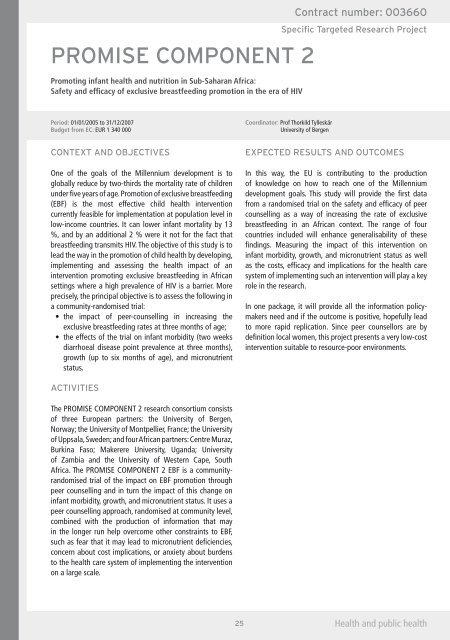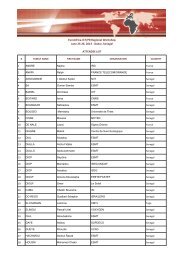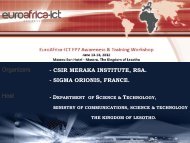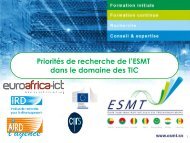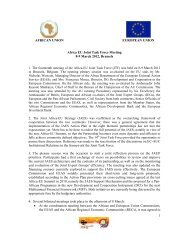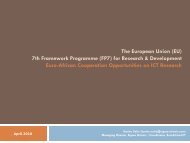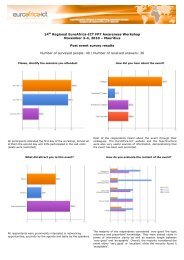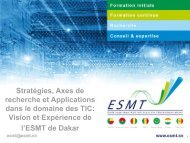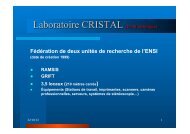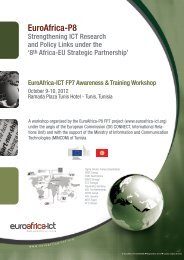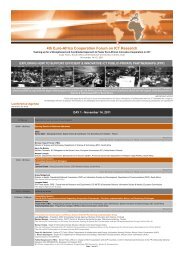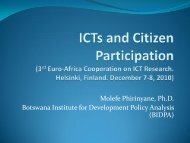part 1 - EuroAfrica-ICT
part 1 - EuroAfrica-ICT
part 1 - EuroAfrica-ICT
Create successful ePaper yourself
Turn your PDF publications into a flip-book with our unique Google optimized e-Paper software.
Promoting infant health and nutrition in Sub-Saharan Africa:Safety and efficacy of exclusive breastfeeding promotion in the era of HIVPeriod: 01/01/2005 to 31/12/2007Budget from EC: EUR 1 340 000Coordinator: Prof Thorkild TylleskärUniversity of BergenOne of the goals of the Millennium development is toglobally reduce by two-thirds the mortality rate of childrenunder five years of age. Promotion of exclusive breastfeeding(EBF) is the most effective child health interventioncurrently feasible for implementation at population level inlow-income countries. It can lower infant mortality by 13%, and by an additional 2 % were it not for the fact thatbreastfeeding transmits HIV. The objective of this study is tolead the way in the promotion of child health by developing,implementing and assessing the health impact of anintervention promoting exclusive breastfeeding in Africansettings where a high prevalence of HIV is a barrier. Moreprecisely, the principal objective is to assess the following ina community-randomised trial: exclusive breastfeeding rates at three months of age; diarrhoeal disease point prevalence at three months),growth (up to six months of age), and micronutrientstatus.In this way, the EU is contributing to the productionof knowledge on how to reach one of the Millenniumdevelopment goals. This study will provide the first datafrom a randomised trial on the safety and efficacy of peercounselling as a way of increasing the rate of exclusivebreastfeeding in an African context. The range of fourcountries included will enhance generalisability of thesefindings. Measuring the impact of this intervention oninfant morbidity, growth, and micronutrient status as wellas the costs, efficacy and implications for the health caresystem of implementing such an intervention will play a keyrole in the research.In one package, it will provide all the information policymakersneed and if the outcome is positive, hopefully leadto more rapid replication. Since peer counsellors are bydefinition local women, this project presents a very low-costintervention suitable to resource-poor environments.The PROMISE COMPONENT 2 research consortium consistsof three European <strong>part</strong>ners: the University of Bergen,Norway; the University of Montpellier, France; the Universityof Uppsala, Sweden; and four African <strong>part</strong>ners: Centre Muraz,Burkina Faso; Makerere University, Uganda; Universityof Zambia and the University of Western Cape, SouthAfrica. The PROMISE COMPONENT 2 EBF is a communityrandomisedtrial of the impact on EBF promotion throughpeer counselling and in turn the impact of this change oninfant morbidity, growth, and micronutrient status. It uses apeer counselling approach, randomised at community level,combined with the production of information that mayin the longer run help overcome other constraints to EBF,such as fear that it may lead to micronutrient deficiencies,concern about cost implications, or anxiety about burdensto the health care system of implementing the interventionon a large scale.Health and public health


